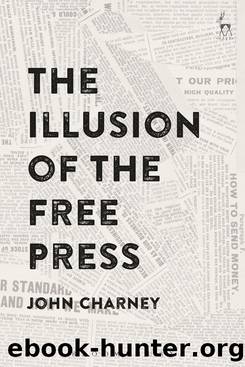The Illusion of the Free Press by John Charney

Author:John Charney [Charney, John]
Language: eng
Format: epub
Tags: law, Media & the Law, Constitutional, political science, human rights
ISBN: 9781509908875
Google: whMevgAACAAJ
Publisher: Bloomsbury Academic
Published: 2018-01-11T23:47:51.256812+00:00
III.Personal Autonomy and Freedom of Speech
Now that the connection between autonomy and self-discovery has been established, it is possible to begin our exploration of relevant theories of freedom of speech and to analyse to what extent these theories conceive of this freedom as a modern instrument of self-discovery. To begin this inquiry, it is necessary to say that these theories are generally grounded in conceptions of personal or individual autonomy,31 and that these conceptions are overtly different from the Kantian conception of moral autonomy just analysed.32 While the latter, as has been seen, is related to the capacity to give to oneself the moral law, the former have been identified with a trait that individuals can exhibit in any aspect of their lives, not only the moral.33 According to Waldron, personal autonomy âevokes the image of a person in charge of his lifeâ, and although it is not an immoral idea, âit has relatively little to do with moralityâ. He adds that those who value it âsee it as a particular way of understanding what each personâs interest consists inâ.34 Similarly, for Raz, a fundamental aspect of personal autonomy is to be the author of oneâs own life.35 To analyse the differences between personal and moral autonomy, it will help to start with a general reassessment of the elements of moral autonomy (universality, reciprocity and self-examination) and compare them with those of personal autonomy.
First of allâas was seen in the previous sectionâalthough moral autonomy presupposes the capacity to give to oneself the moral law, the moral law is still universal. Universality, on the other hand, seems to be at odds with conceptions of personal autonomy that centre on the uniqueness of each individualâs interests, choices and decisions. Similarly, if those who value personal autonomy do so as way of valuing the unique character of each and every individual, as Waldron suggests,36 those who value moral autonomy recognise that each personâs interests must be reconciled with the interests of others. This is why Johnston states that while moral autonomy involves certain conceptions of justice, personal autonomy involves only conceptions of the good.37 Hence, while the element of reciprocity is essential for conceptions of moral autonomy, it is not so for conceptions of personal autonomy. Accordingly, moral reflection leads to a universal law that any rational agent should be capable of identifying and applying to a particular circumstance; this is a law that enjoins one to consider all those who might be affected by oneâs actions. The exercise of personal autonomy, by contrast, might produce a number of varied responses potentially equal to the number of autonomous individuals making decisions on their own; this is why, for example, a person who renounces her talents and decides to dedicate her life to self-indulgence might do so as an exercise of personal autonomy.38 However, this would certainly count as a failure to exercise moral autonomy.39
Despite these differences and the sharpness with which proponents of personal autonomy separate their conceptions from those of moral autonomy,40
Download
This site does not store any files on its server. We only index and link to content provided by other sites. Please contact the content providers to delete copyright contents if any and email us, we'll remove relevant links or contents immediately.
| Coloring Books for Grown-Ups | Humor |
| Movies | Performing Arts |
| Pop Culture | Puzzles & Games |
| Radio | Sheet Music & Scores |
| Television | Trivia & Fun Facts |
Spare by Prince Harry The Duke of Sussex(4199)
Paper Towns by Green John(4169)
Never by Ken Follett(2882)
Learning C# by Developing Games with Unity 2021 by Harrison Ferrone(2875)
Fantastic Beasts and Where to Find Them: Illustrated edition by J.K. Rowling & Newt Scamander(2469)
The Man Who Died Twice by Richard Osman(2300)
Machine Learning at Scale with H2O by Gregory Keys | David Whiting(2292)
0041152001443424520 .pdf by Unknown(2220)
How The Mind Works by Steven Pinker(2214)
Fairy Tale by Stephen King(2071)
Fantastic Beasts and Where to Find Them: The Original Screenplay by J. K. Rowling(2044)
Will by Will Smith(2043)
Reminders of Him: A Novel by Colleen Hoover(1881)
The God delusion by Richard Dawkins(1848)
Borders by unknow(1786)
Rationality by Steven Pinker(1765)
The Dawn of Everything: A New History of Humanity by David Graeber & David Wengrow(1571)
The Artist's Way by Julia Cameron(1566)
Cloud Cuckoo Land by Anthony Doerr(1435)
